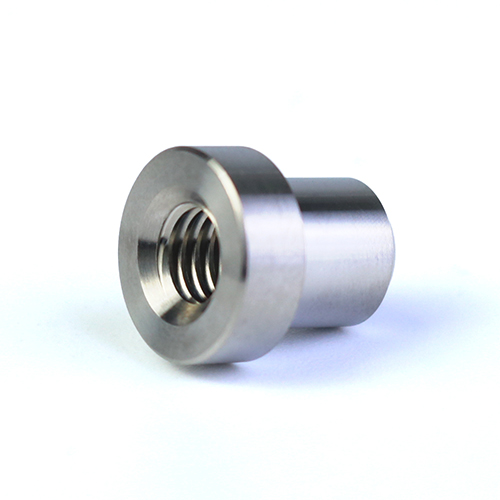In the vast starry sky of modern manufacturing, titanium CNC parts are becoming a dazzling star with their excellent performance and wide applications, leading high-end manufacturing towards a new journey.
The Light of Innovation in the Medical Field
In the medical industry, titanium CNC parts are like a beam of innovative light, bringing new hope to patients. Titanium alloy has become an ideal material for manufacturing implantable devices due to its excellent biocompatibility, and CNC machining technology maximizes its advantages. From artificial joints to dental implants, from spinal fixators to pacemaker housings, titanium CNC parts provide patients with better treatment options. Taking artificial joints as an example, through CNC machining, it is possible to accurately manufacture joint surfaces that perfectly match human bones, ensuring smooth joint movement and long-term stability. At the same time, in the field of medical equipment, such as high-precision surgical instruments, medical centrifuge rotors, etc., the high precision and corrosion resistance of titanium CNC parts ensure the precise operation and hygiene standards of the equipment, providing strong support for the progress of medical technology.
A sturdy defense line for ships and ocean engineering
In the turbulent ocean environment, ships and marine engineering face severe challenges such as seawater corrosion and wind and wave impact. Titanium CNC parts have become a key element in building a strong defense line. The propellers, shaft systems, and other components in marine propulsion systems are prone to corrosion from traditional materials during long-term contact with seawater. However, titanium CNC parts, with their excellent resistance to seawater corrosion, greatly extend the service life of these components, reduce maintenance frequency, and ensure the safety and operational efficiency of the ship’s navigation. In the construction of offshore platforms, titanium CNC parts are used to manufacture key structural components that can withstand the erosion and impact of harsh marine environments, ensuring that the offshore platform stands firm in strong winds and waves, and providing reliable guarantees for the development and utilization of marine resources.
Strong driving force for industrial manufacturing upgrading
In addition to the aforementioned fields, titanium CNC parts have sparked a wave of upgrading in the entire industrial manufacturing industry. In the chemical industry, titanium CNC parts are used for reactor liners, heat exchanger tube plates, etc., which can effectively resist the erosion of various corrosive media, ensuring the safety, stability, and continuous operation of chemical production. In the field of high-end equipment manufacturing, the high precision and excellent performance of titanium CNC parts play an important role in improving the overall performance of equipment. With the continuous advancement of CNC machining technology, the manufacturing accuracy and complexity of titanium parts continue to improve, and production costs gradually decrease, which further expands their application scope and becomes a strong driving force for promoting the development of industrial manufacturing towards high-end, intelligent, and green.
Manufacturing process of titanium CNC parts
The manufacturing of titanium CNC parts is a complex and precise process. Firstly, in the raw material preparation stage, high-quality titanium alloy materials should be selected, which need to undergo strict inspection, including chemical composition analysis, physical property testing, etc., to ensure their purity and performance meet the processing requirements.
The next step is the programming design phase, where engineers use professional CNC programming software to write precise machining programs for the machining process based on the design drawings of the parts. This program will provide detailed specifications for key parameters such as tool path, cutting speed, and feed rate, serving as a guide for subsequent machining actions.
Then enter the processing stage, where the main processing methods include turning, milling, drilling, boring, grinding, etc. During the turning process, the titanium alloy billet is rotated by a CNC lathe to accurately remove excess material and form the basic shape of the part. Milling can process complex shapes on the surface of parts, such as the curved surface of aircraft engine blades. Drilling and boring are used to manufacture high-precision hole positions, while grinding can further improve the surface accuracy and smoothness of parts. During the entire machining process, due to the high hardness and low thermal conductivity of titanium alloy, the requirements for cutting tools are extremely high. Special hard alloy or ceramic cutting tools need to be used and replaced in a timely manner according to the machining situation to ensure machining quality.
After the processing is completed, the quality inspection process is carried out, using various advanced testing equipment such as coordinate measuring instruments to comprehensively inspect the dimensional accuracy of the parts, ensuring that each dimension is within the design tolerance range. The flaw detector is used to check for defects such as cracks inside the parts, while the hardness tester measures whether the hardness of the parts meets the standards. Only titanium CNC parts that have passed strict testing will proceed to the next stage.
Finally, in the surface treatment and packaging stage, some surface treatments may be carried out according to the requirements of the parts, such as passivation treatment to improve corrosion resistance. After completion, the parts will be properly packaged to prevent damage during transportation and storage.
Technological Innovation and Future Prospects
However, the development of titanium CNC parts has not been smooth sailing. During the machining process, the high hardness and low thermal conductivity of titanium alloys pose many challenges to CNC machining, such as fast tool wear and low machining efficiency. But it is precisely these challenges that have ignited the innovation enthusiasm of researchers and engineers. Nowadays, new tool materials, advanced processing techniques, and intelligent CNC machining systems are constantly emerging, gradually overcoming these difficulties. Looking ahead to the future, with the deep integration and development of multiple disciplines such as materials science and CNC technology, titanium CNC parts will undoubtedly demonstrate their unique charm in more fields, create more value, and become the core force driving the vigorous development of the global high-end manufacturing industry.
Post time: Nov-23-2024





